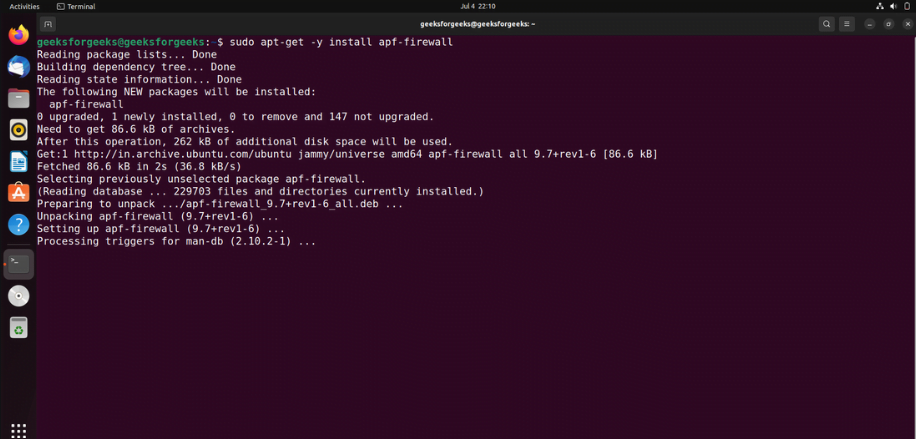When securing your cPanel server, having reliable firewall software is crucial. With so many options available, choosing the right one for your needs can be overwhelming. In this blog post, we will take an in-depth look at four popular cPanel firewall software options: ConfigServer Security & Firewall (CSF), FirewallD, Advanced Policy Firewall (APF), and Uncomplicated Firewall (UFW). We will compare their features, security capabilities, and ease of use to help you decide which firewall software best suits your cPanel server.
Understanding Firewall Basics and Their Importance in cPanel
Magnetic firewalls can be considered one of the best sets of shields for all cPanel servers since they help to avoid possible cyber threats by controlling the flow of traffic. A firewall inspects the data packets wanting to enter or exit the server to allow only those, which conform to the set security rules. This capability is handy in a cPanel environment where multiple websites and applications may be hosted, all of which will have different security postures and risks.
In this environment, firewalls remain critical as they act as the initial barrier of defense against a range of cyber threats involving access attempts, DDoS attacks, and infiltration of malicious malware. The tasks of firewalls include controlling network traffic and protecting the server’s integrity and availability; thus, the hosted websites and applications are kept safe and running.
This means that they need to select the firewall that should correspond to the peculiarities of the server and its security and operation while protecting the information that is considered to be confidential and supporting the stability of the cPanel servers.
An Overview of ConfigServer Security & Firewall (CSF)
ConfigServer Security & Firewall (CSF) stands out as a highly favored option among cPanel firewall solutions thanks to its comprehensive suite of security features that cater to a broad spectrum of security needs. One of the features that CSF provides in real-time and with high precision is the intrusion detection feature that allows detection of any suspicious activities with an intent to violate or gain unauthorized access into a network, brute force attacks apart from provisions of instant triggers of alerts and subsequent actions to prevent possible threats.
Also, CSF is better suited at identifying failed logins on multiple services, including SSH, SMTP, and IMAP, to name a few, and this creates an opportunity for administrators to undertake necessary actions against potential intrusions.
The second unique feature of CSF is the link with the tracking server, which serves a crucial role in filtering the incoming & outgoing traffic to the server. This feature is helpful in the discrimination and subsequent filtering of all undesired traffic, hence protecting the server from DDoS attacks and other networking invasions. Moreover, CSF works in one unity with cPanel, making using firewall rules and settings incredibly easy. Since the settings are easily accessible and adjustable in the environment of cPanel, the work with security settings becomes more convenient and does not require transitioning to another application or program.
In addition to the more fundamental features of a firewall, CSF provides extra features for scanning and the reinforcement of security, making it an all-around security shield for cPanel servers. Lauded as the solution by the user base and leveraged by many organizations, the matters state for the improved effectiveness of providing users with steady, impactful, and easy-to-manage security for the cPanel environments.
Exploring FirewallD’s Capabilities and cPanel Compatibility
FirewallD, developed by the minds at Red Hat, represents a shift from static to more dynamic firewall management approaches suitable for both persistent and transient network environments. Its architecture is created to address the processing of the firewall policies using the so-called zones that define connections and interfaces depending on the level of trust and their type. This characteristic of zoning is useful in that it enables the formulation of more focused and applicable rules to administration in situations where different security measures are described for a given network.
Additionally, FirewallD leverages the power of rich rules that allow for a more detailed specification of allowed or denied traffic, incorporating conditions based on source and destination addresses, ports, protocols, and even modules. This helps increase security precision and also makes the firewall rules more structured and easy to interpret as compared to the conventional iptables entries.
For cPanel users, while FirewallD’s integration is not as direct or seamless as CSF, it still offers a robust framework for securing servers. Its compatibility with cPanel comes into play through manual configuration or scripting, requiring more effort from the system administrator’s side. However, once configured, FirewallD provides a stable and flexible firewall solution that can dynamically adjust to the changing demands of a cPanel hosting environment, making it a viable option for those willing to navigate its initial setup complexities.
Diving into Advanced Policy Firewall (APF)
Advanced Policy Firewall (APF) distinguishes itself in the realm of cPanel firewall solutions with its straightforward, iptables-based framework. Primarily celebrated for its simplicity and ease of deployment, APF focuses on the core elements of firewall protection without overwhelming users with complex configurations. Able to handle the IP blocklisting and port blocking feature effectively meets and satisfies most servers’ primary requirement of a safe hosting platform by systematically eliminating unwanted traffic and possible threats.
One can easily conclude that this is the beauty of APF, especially for a novice in server administration or somebody who is not highly tech-savvy. Firewall rules are easily changed using the software, and this means that in the event of new security threats, there can be quick intervention. Even though APF is a very basic firewall, it is not very weak since it presents dependable packet filtering realizations, forming an excellent strong wall against intruders.
While it does not possess many of the features seen in other programs of a similar category, APF is well-equipped to manage fundamental security issues without any problems. In conclusion, focusing on the aspects of ease of use and minimal configuration, the Advanced Policy Firewall can be considered to be slightly below medium in protective capabilities, thus asserting its ability to be one of the firewalls for a cPanel server.
Understanding Uncomplicated Firewall (UFW) and Its Use with cPanel
Uncomplicated Firewall (UFW) offers an accessible gateway for Linux users to manage iptables without delving into its complexities. Although developed with simplicity as the main focus, UFW makes managing the traffic passing through the firewall easy through its clean-line interface, which is suitable for those who do not understand much about firewalls. Concerning the cPanel-based servers, it should be understood that UFW is not designed for this environment.
However, it can produce a good result when integrated adequately for the servers’ security enhancement. Due to its easy-to-understand syntax, it is very efficient to create, update, and delete rules on the firewall, thus making managing the different services hosted on cPanel very efficient. To simplify matters further, you have predefined application profiles that help in the configuration processes since they will predefine the settings for commonly used applications and services in an organization.
Although integrating UFW into a cPanel setup may require initial manual steps, its simplicity and direct approach to firewall management can significantly benefit users looking for an effective, no-frills security layer on their Linux-based cPanel servers.
Detailed Comparison: Features, Security, and Ease of Use
By comparing and contrasting CSF, FirewallD, APF, and UFW, it would be essential to go further and focus on the details of the system’s features to determine which firewall software best fits the existing operations. CSF can be methodically distinguished for a triumphant series of characteristics, with an IDS and great login failure logging accommodating customers who seek extremely secure systems with highly sophisticated and functioning tracking and alarms.
Its user interface within cPanel allows for a seamless management experience, making it highly user-friendly.
Still, it is simplified with FirewallD which offers the concept of zoning which provides active control over the traffic, and this is great for environments where the levels of trust and interaction vary. While it does not have the direct connection to cPanel as found in CSP, it has the setting of detailed rules based on extended conditions which makes it ideal for those that need a tool with flexibility when configuring them.
APF, with its emphasis on simplicity and ease of use, offers a straightforward iptables-based interface that prioritizes ease over complexity. Due to its simple layout and the basic specifications of firewall operations can be quite helpful for users who do not want to adjust to complex settings and features.
UFW, which stands for Unix Firewall, is quite elementary for being practical and excels in situations where complex firewall control is unnecessary. Its command-line interface and predefined application profiles allow the users who have to apply or modify the rules of a firewall immediately without going deep into configurations.
Each software brings distinct advantages to the table, with CSF leading in comprehensive security features, FirewallD offering dynamic control, APF providing simplicity, and UFW emphasizing ease of use for basic firewall management tasks.
Recommendations Based on Different User Needs
Selecting the right firewall software for your cPanel server hinges on understanding the specific security and operational requirements of your environment. For those searching for a firewall with extensive security features and intuitive management capabilities, ConfigServer Security & Firewall (CSF) is the top recommendation.
If you prioritize dynamic control and have a hands-on approach to your server’s security, FirewallD’s flexibility and zoning capabilities make it an attractive option. Advanced Policy Firewall (APF) is ideal for users who prefer a straightforward, efficient firewall solution with minimal configuration fuss. Meanwhile, Uncomplicated Firewall (UFW) appeals to users looking for an easy-to-use, command-line interface for managing basic firewall tasks. Assess your server’s needs carefully to choose the firewall software that best matches your requirements.



